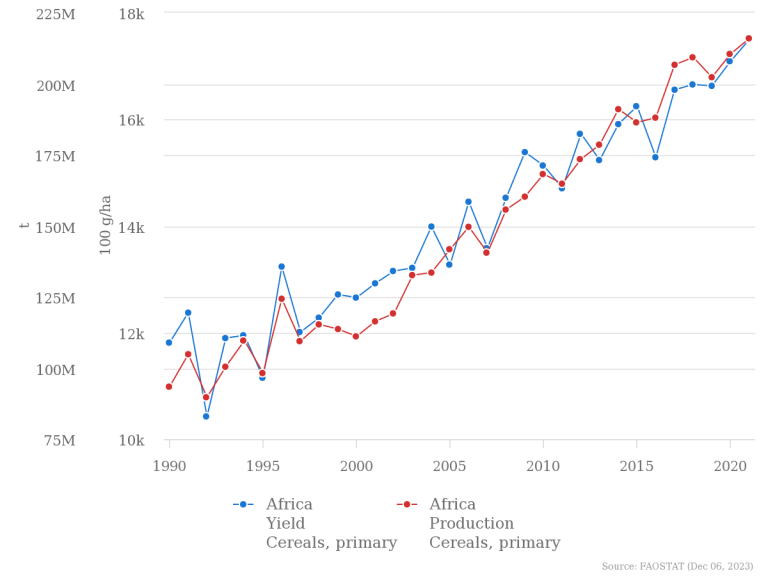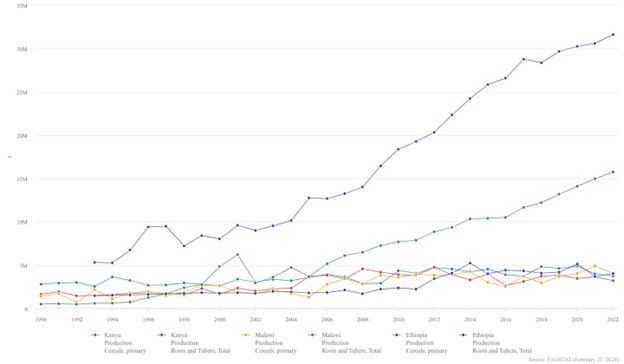By Anthony Watts and H. Sterling Burnett
An article published in BNN Breaking News by author Aqsa Younas Rana, titled “Climate Change to Plunge 200 Million Africans into Severe Hunger by 2050” asserts that climate change will result in widespread hunger, starvation, and agricultural revenue decline in Africa by 2050. The claims are unsubstantiated and contrary to real world data and trends on food production and revenue.
The article opens describing a dystopian future in Africa:
Imagine waking up one day to find that the very ground under your feet, once fertile and life-giving, has turned barren. The streams that meandered through your village, brimming with life, now barely whisper. The crops that danced in the wind, promising a bountiful harvest, stand withered. This isn’t a scene from a dystopian novel; it’s a looming reality for millions in Africa, as recent studies project a grim future where 200 million Africans could face severe hunger by 2050 due to the impacts of climate change.
The story doesn’t reference any data or a single study as basis for its prediction of the future, rather it issues a one sentence warning, “[a]ccording to recent findings, agricultural productivity is expected to plummet, with crop revenue forecasted to decrease by 30%.
There is no reference or citation given for the predicted 30 percent decline that Rana warns of, and the evidence that does exist actually indicates that during the recent modest warming, African crops and agricultural revenue have been regularly setting records.
Climate Realism has pointed out across multiple articles that crop production and yields have improved dramatically in most places in Africa during the recent period of modest warming. One recent article by Linnea Lueken, Wrong, Washington Post, Warming Hasn’t Harmed African Crop Production, shows the extent to which climate change has benefitted African farmers:
Data clearly show that the IMF’s claims about warming causing a decline in African crop production is patently and obviously false. Crop production in Africa in general, and Ethiopia in particular increased dramatically over recent decades, even as the planet has experienced a warming of more than 1℃. To reiterate the point, as warming has occurred, crop production and yields have increased, not decreased. Also, real world data and peer reviewed agronomy research provides no reason for believing these trends will change in the future, absent political interference in to use of fossil fuels to plant, fertilize, harvest, and deliver crops.
This graph showing agricultural yields and production for primary cereal grains dramatically increased since 1990 at the same time that climate change was supposedly warming the continent of Africa:

Rana mentions Ethiopia, Kenya, and Malawi as specifically threatened by crop losses, yet since 1990 foundational cereal crops and roots and tubers have increased dramatically in each of those countries. Since 1990 (1993 Ethiopia), the U.N. Food and Agriculture Organization reports that:
- In Ethiopia, despite civil strife, cereal crop production grew by approximately 496 percent, and root and tuber production increased by a little over 176 percent;
- In Kenya, cereal crop production expanded by about 35 percent, and root and tuber production enlarged by almost 97 percent;
- In Malawi, cereal crop production expanded by about nearly 185 percent, and root and tuber production grew by an astonishing 3,082 percent. (see the figure below)
Africa in general has seen dramatic increases in agriculture, as demonstrated in numerous other Climate Realism posts, like, here, here, here, and here. Clearly, climate change is not causing a decline in African crop production or harming African farmers.
Agriculture is the top source of income in most of the countries on the African continent with a few exceptions, and economic growth in Africa has been strong in recent decades. “Growth has been present throughout the continent, with over one-third of African countries posting 6% or higher growth rates, and another 40% growing between 4% and 6% per year, reports the World Bank.
With these facts in evidence, the obvious question is: where is the damage to agriculture from climate change claimed by BNN?
The BNN article misses the most obvious factor that has restrained crop production in recent years in some African countries, and caused dramatic fluctuations in others, namely political and civil unrest. According to the website African business, civil unrest is at a six-year high:
A surge in civil unrest in Africa, fueled by political tensions, food insecurity, and government inefficiencies threatens stability, disrupts businesses, and stirs up social and economic crises in the region, new report finds.
…
36 African countries experienced a surge in risk between 2022-Q2 and 2023-Q2, marking the continent’s largest annual increase since the dataset’s inception in 2017, Verisk Maplecroft’s Civil Unrest Index reveals.
The number of African countries now categorized as high or extreme risk for civil unrest has also risen to 37, a significant jump from 28 just six years ago.
Civil unrest threatens farmers’ livelihoods. Even when farms and farmers themselves aren’t in a war zone, such unrest and political fighting often limits farmers access fuel, fertilizer, seeds, and makes it hard, if not impossible, to transport their crops to market. War, rebellion, and civil unrest presents a far more immediate and disruptive danger to agricultural production in Africa, than the gradual warming of the climate over the past 100 years, or any potential warming one might realistically expect by 2050.
None of these facts stopped BNN from writing a poorly researched and unreferenced opinion piece claiming that climate change was the primary problem threatening agricultural production in Africa. Facts just get in the way when the media source wishes to push an alarming climate change narrative.






















Political and civil unrest change says a lot more than the climate changing whatever that even means! When you cite no evidence and make an outlandish claims of crop failures you’re either a prophet of doom or a phony journalist! Phony journalism is the rule anymore, no real investigative reporting just political propaganda and misinformation! Good thing climate realism calls out all these falsehoods and reports the truth!